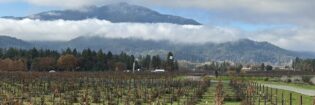Where, oh where, did my Grenache rosé go?
Before I realized what was happening, I had only a quarter left in the second bottle that I received from L’Ecole No. 41 as part of a year-long partnership. This summer thirst-quencher did quite a disappearing act – especially with the nibblers and light cuisine we tend to prepare this time of year.
Everything seems to be coming up Grenache for me lately – a red last month from Aragón, Spain, then a Vin Doux Naturel sweet dessert wine from Maury in southern France – and now this bright, juicy, easygoing rosé from one of the premier wine producers in Walla Walla, Washington. You can read about L’Ecole in my previous posts about their Chenin Blanc, Cabernet Sauvignon and Semillon, Seven Hills Syrah, Cabernet Franc/Merlot blend, and Columbia Valley Merlot.
Please note that while the wine for this post was provided, opinions are my own.
Balance is the name of the game
What I really appreciate about L’Ecole’s Grenache rosé is how balanced it is. Winemaker Marcus Rafanelli is going for that balance every year. “It’s not linear,” he notes, describing the wine and his process on a recent Zoom call. “We want it [balanced] over the whole palate.”
Rafanelli uses the maceration method to produce this rosé from red grapes harvested early, before they fully ripen and while they retain much of their acidity. “Basically, we’re making a white wine from red grapes,” he explains. Grapes are held three to four hours on their skins. Total soaking time is anywhere from two to 24 hours.
“We’ve tracked fermentation rates [over the years] and decided where to stop it,” Rafanelli explains. By using sulfur dioxide to stop the hungry yeast from gobbling up all the sugar, he gets precisely the sugar/acid balance he’s seeking – year in and year out. Sulfur can bleach wine, he says, but over time it returns to the pale salmon color he wants in the finished wine.
This Grenache rosé is one of only two L’Ecole wines that doesn’t see oak (the other is Chenin Blanc) and the only one that does not go through malolactic fermentation, a process that softens acidity.
L’Ecole’s been making this same Provence style of Grenache rosé from this same vineyard (Alder Ridge) in Horse Heaven Hills since 2009.
“We’re growing it for rosé,” says Constance Savage, L’Ecole’s general manager and chief operating officer. This five-acre, terraced block of Grenache sits on a steep, south-facing and arid ridge overlooking the Columbia River, on the southern edge of Horse Heaven Hills (see map, above). “It’s a warmer site than others,” she explains.
Unless I can rustle up another bottle of this wine in the greater Seattle area, that’s it for me. L’Ecole produced 1,000 cases of this site-specific rosé and they’re gone, gone, gone. Club members were lucky enough to receive bottles in their boxes.
“We’re all about grower relationships,” Savage notes. So pulling additional grapes out of some bulk market to make more rosé is not possible.
Moral of the story: Enjoy it while it lasts – and order early next year!
My tasting notes: Salmon in color. Delicate nose of nectarine and a hint of rose. Palate is bright with medium+ acidity. I get juicy watermelon and grapefruit upfront, followed by strawberry on a medium+, minerally finish. At 4.5 grams of sugar per liter, it’s just slightly off dry. Alcohol: 13.5%. Price: $21.
Suggested pairings: Charcuterie plate, grilled fish or chicken, or a good porch sipper all by itself.



